|
|
|
Sort Order |
|
|
|
Items / Page
|
|
|
|
|
|
|
| Srl | Item |
| 1 |
ID:
091867


|
|
|
|
|
| Publication |
2009.
|
| Summary/Abstract |
This article is written against the backdrop of widely discussed changes in Japanese foreign security policy in the 2000s-changes often attributed to an intensifying North Korea threat and growing rivalry with China. Employing Walt's notion of "threat" (in effect, offensive power plus aggressive intentions), the thesis of this article is that China and North Korea could be construed as increasingly threatening to Japan. The antithesis is that changes in Japanese foreign security policy have rather taken place within the context of a public discourse that has increasingly framed China and North Korea as "threats." The article demonstrates that, while Chinese military capability has burgeoned in the past decade, North Korea has experienced something like military stagnation. Moreover, although both actors have histories of foreign aggression, their respective official discourses lack aggressive intentions vis-a-vis Japan. The article also demonstrates that while Japanese government sources have kept framing North Korea as a threat or a grave security concern, China has merely been depicted as "in need of further attention." To understand these ambivalent results, the article introduces the synthesizing idea that a North Korean "threat" might serve as a "perfect excuse" for changing Japanese foreign security policy in the face of what could obviously be construed as a more pressing China threat.
|
|
|
|
|
|
|
|
|
|
|
|
|
|
|
|
| 2 |
ID:
099443
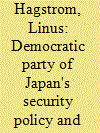

|
|
|
|
|
| Publication |
2010.
|
| Summary/Abstract |
A Referendum Law took effect in Japan in May 2010. Since a referendum is a prerequisite to any change to the Japanese 'Peace Constitution', this is an event with potentially far-reaching consequences. By gauging the Democratic Party of Japan's views on the issue of revision of the constitution-particularly revision of the famous Article 9, with remains a foundation of Japanese security policy-and by extrapolating on the findings, this article aims to further the understanding of the new government's security policy more generally. After finding that the probability that the Japanese government will capitalise on the coming into force of the Referendum Law to reopen the constitutional debate is currently low, the article advances a number of hypotheses as to why this is the case, and discusses scenarios under which the status quo could change. Finally, it draws out the implications (a) of the preceding analysis for DPJ security policy, and (b) of DPJ security policy for the interpretation of the constitution where Article 9 is concerned.
|
|
|
|
|
|
|
|
|
|
|
|
|
|
|
|
| 3 |
ID:
178690
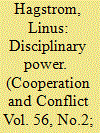

|
|
|
|
|
| Summary/Abstract |
This article draws on identity construction, emotions and a notion of productive power to address the question of why Swedish policymakers and public opinion are becoming increasingly supportive of NATO membership. It contributes theoretically by arguing that such textual phenomena intertwine with ‘disciplinary power’, which operates on the bodies of the subjects of power, exposing them to verbal and physical sanctions, a host of complex feelings and enhanced levels of self-disciplining. The article analyses 354 editorials and op-eds related to Sweden and NATO, published in the four biggest Swedish newspapers in 2014–2018; 1408 tweets, with a focus on 14 selected NATO campaigners and their advocacy; and semi-structured interviews with 12 such influencers. It concludes that Swedish NATO campaigners produce and negotiate emotional discourses in a way that targets other influencers and potential influencers by exposing them to ridicule and allegations of treason. While tendencies are similar on both sides of the debate, the article demonstrates that productive power currently intertwines with disciplinary power in a way that makes anti-NATO advocacy seem more fraught with personal risk than pro-NATO campaigning, and joining NATO appear to be the most normal, realistic and responsible policy option.
|
|
|
|
|
|
|
|
|
|
|
|
|
|
|
|
| 4 |
ID:
076785
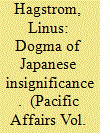

|
|
|
| 5 |
ID:
133964
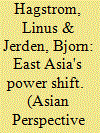

|
|
|
|
|
| Publication |
2014.
|
| Summary/Abstract |
The widespread debate on an East Asian power shift is generally based on the crude notion that power and capability are interchangeable. We critique this view and offer the alternative that power is the capacity of actors and discourses to produce effects- what we call relational and productive power, respectively. We also engage in a reflexive exercise by addressing the productive power of the power-shift debate itself, and emphasize the danger that this debate might enable the kind of realpolitik that it forebodes.
|
|
|
|
|
|
|
|
|
|
|
|
|
|
|
|
| 6 |
ID:
137135
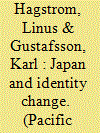

|
|
|
|
|
| Summary/Abstract |
Two approaches to identity have been employed to explore issues in Japan's international relations. One views identity as constituted by domestic norms and culture, and as constitutive of interests, which in turn cause behaviour. Proponents view Japan's ‘pacifist’ and ‘antimilitarist’ identity as inherently stable and likely to change only as a result of material factors. In the other approach, ‘Japan’ emerges and changes through processes of differentiation vis-à-vis ‘Others’. Neither ‘domestic’ nor ‘material’ factors can exist outside of such identity constructions. We argue that the second, relational, approach is more theoretically sound, but begs three questions. First, how can different identity constructions in relation to numerous Others be synthesised and understood comprehensively? Second, how can continuity and change be handled in the same relational framework? Third, what is the point of analysing identity in relational terms? This article addresses the first two questions by introducing an analytical framework consisting of three mutually interacting layers of identity construction. Based on the articles in this special issue, we argue that identity entrepreneurs and emotions are particularly likely to contribute to change within this model. We address the third question by stressing common ground with the first approach: identity enables and constrains behaviour. In the case of Japan, changes in identity construction highlighted by the articles in this special issue forebode a political agenda centred on strengthening Japan militarily.
|
|
|
|
|
|
|
|
|
|
|
|
|
|
|
|
| 7 |
ID:
061695
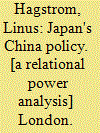

|
|
|
|
|
| Publication |
London, Routledge, 2005.
|
| Description |
xiv, 230p.
|
| Series |
European institute of Japanese studies, East Asian economics and business series
|
| Standard Number |
0415346797
|
|
|
|
|
|
|
|
|
|
|
|
Copies: C:1/I:0,R:0,Q:0
Circulation
| Accession# | Call# | Current Location | Status | Policy | Location |
| 049620 | 327.5205109045/HAG 049620 | Main | On Shelf | General | |
|
|
|
|
| 8 |
ID:
193014
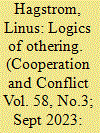

|
|
|
|
|
| Summary/Abstract |
‘Othering’ – the view or treatment of another person or group as intrinsically different from and alien to oneself – is a central concept in the International Relations literature on identity construction. It is often portrayed as a fairly singular and predominantly negative form of self/Other differentiation. During the first months of the COVID-19 pandemic, Sweden at first glance emerged as exactly such a negative Other. This article problematises such a view of Othering. Departing from a narrative analysis of news reporting on Sweden’s management of COVID-19 in the United States, Germany and the Nordic states, the article proposes an ideal type model with four forms of Othering – emotional, strategic, analytic and nuanced – not recognised in previous research. These types differ in their treatment of the Other as more or less significant and in involving a more or less self-reflexive construction of the self. Although narratives in all these settings drew on previously established narratives on Sweden, they followed different logics. This has implications for our understanding of Sweden as an Other in the time of COVID-19, as well as of self/Other relations in International Relations more broadly.
|
|
|
|
|
|
|
|
|
|
|
|
|
|
|
|
| 9 |
ID:
074983
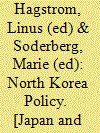

|
|
|
|
|
| Publication |
London, Routledge, 2006.
|
| Description |
ix, 177p.
|
| Series |
Economics and Business Series
|
| Standard Number |
0415399165
|
|
|
|
|
|
|
|
|
|
|
|
Copies: C:1/I:0,R:0,Q:0
Circulation
| Accession# | Call# | Current Location | Status | Policy | Location |
| 051909 | 327.5193/HAG 051909 | Main | On Shelf | General | |
|
|
|
|
| 10 |
ID:
137141
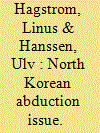

|
|
|
|
|
| Summary/Abstract |
After Kim Jong-il's confession in 2002 that North Korean agents had abducted thirteen Japanese citizens in the 1970s and 1980s, North Korea has become the most detested country in Japan, and the normalisation of bilateral relations has been put on the back burner. The abduction issue has taken precedence in Japan even over North Korea's development of nuclear weapons and long-range missiles. It has also grossly overshadowed the atrocities for which Imperial Japan was responsible in the 20th century. Why has there been such strong emphasis on an issue that could be disregarded as comparatively ‘less important’? This article understands the ascendency of the abduction issue as the epitome of an identity shift under way in Japan – from the identity of a curiously ‘peaceful’ and inherently ‘abnormal’ state, to that of a more ‘normal’ one. The differentiation of North Korea as ‘abnormal’ emphasises Japan's own (claim to) ‘normality’. Indeed, by incarnating the perils of Japan's own ‘pacifist’ ‘abnormality’, which has been so central to the collective sense of Japanese ‘Self’ in the post-war period, the abduction issue has become a very emotional argument for Japan's ‘normalisation’ in security and defence terms. The transformation from ‘abnormal’ to ‘normal’ is further enabled by Japan trading places with North Korea in the discourse, so that Japan is defined as ‘victim’ (rather than former aggressor) and North Korea as ‘aggressor’ (rather than former victim). What is at stake here is the question whether Japan is ‘normalising’ or ‘remilitarising’, and the role of the abduction issue discourse in enabling such foreign and security policy change.
|
|
|
|
|
|
|
|
|
|
|
|
|
|
|
|
| 11 |
ID:
169223
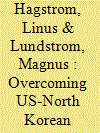

|
|
|
|
|
| Summary/Abstract |
Periods of mutual enmity in US-North Korean relations are typically interrupted by more conciliatory gestures. How can the many twists and turns in this relationship be explained and hopefully overcome so that more long-lasting détente is accomplished? Drawing eclectically on realism and constructivism, we conclude that a nuclear deal should address not only North Korea’s interests in security and regime survival, but also its status concerns. Applying the same theories to the other part of the dyad – the US – we conclude that it may now have material interests in ameliorating the relationship, but that such a development requires US foreign policy discourse to cease depicting North Korea as “irrational” and “evil”.
|
|
|
|
|
|
|
|
|
|
|
|
|
|
|
|
| 12 |
ID:
119244
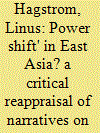

|
|
|
|
|
| Publication |
2012.
|
| Summary/Abstract |
Great symbolic value has been invested in the incident between Japan and the People's Republic of China (PRC, China) that began in waters surrounding the disputed Diaoyu/Senkaku Islands on September 7, 2010.1 Although several distinct narratives on the incident have appeared, the leading one essentially interprets its process and fallout as (further) evidence of an ongoing 'power shift' in East Asia, or explains it as a consequence of such a 'power shift'.2 In this instance, Chinese 'aggressiveness' or 'pressure', and Japanese 'weakness' or 'defeat' are viewed respectively as reflections of 'China's rise' and 'Japan's decline'.
|
|
|
|
|
|
|
|
|
|
|
|
|
|
|
|
| 13 |
ID:
064684
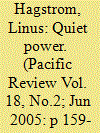

|
|
|
| 14 |
ID:
066282
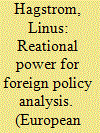

|
|
|
| 15 |
ID:
091582


|
|
|
|
|
| Publication |
2009.
|
| Summary/Abstract |
This article analyzes Japanese foreign security policy and recent talk of "remilitarization." It does so by assessing the changes that most closely parallel the analytical interests of three sets of major international relations theories: namely capability (realism), policy (liberalism), and normative context (constructivism). Japanese responses to recurring North Korean missile tests moreover provide a source for a contextually bound analysis of policy and self-image. The article confirms that the last two decades have witnessed a number of important changes in security aspects of Japanese foreign policy but concludes that these changes are not nearly so dramatic as to justify the bold language of many Japan specialists. Hence, it serves to moderate the scholarly tendency to overemphasize or overly dramatize the changes in Japanese security policy.
|
|
|
|
|
|
|
|
|
|
|
|
|
|
|
|
| 16 |
ID:
113944
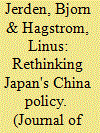

|
|
|
|
|
| Publication |
2012.
|
| Summary/Abstract |
For the last four decades Sino-Japanese relations have been characterized by steadily growing economic and sociocultural interactions. Yet, greater interdependence has developed in tandem with bilateral tensions. Many analysts have attempted to explain the latter as a result of Japan trying to balance or contain the burgeoning growth of Chinese capabilities. In this article, we question and qualify this widespread understanding of Japan's response to China's rise by examining how Japan has handled China's rise between 1978 and 2011. More precisely, how has Japan dealt with China's long-term core strategic interests, which are embodied in the post-1978 Chinese "grand strategy" that is believed to have been instrumental to China's rise? Our main finding is that to a significant degree Japan has accommodated the rise of China rather than balanced against it.
|
|
|
|
|
|
|
|
|
|
|
|
|
|
|
|
| 17 |
ID:
088746
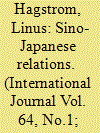

|
|
|
| 18 |
ID:
076784
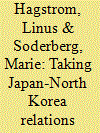

|
|
|
| 19 |
ID:
101631
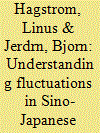

|
|
|
|
|
| Publication |
2010.
|
| Summary/Abstract |
From the late 1990s to the late 2000s, scholarly literature and media analysis shifted from representing the Sino-Japanese relationship as generally "good," to portraying it as generally "bad," and then back to describing it as generally "good" again. This article aims to make sense of what could thus be construed as fluctuations in Sino-Japanese relations and Japan's China policy, through employing discourse analysis as foreign policy theory. The aim is operationalized by analyzing Japanese China discourse as it has played out in the Diet. The article demonstrates that there is a fault line between a "radical representation," epitomizing further politicization of a prevalent Japanese sense of insecurity about China, and a "moderate representation," reflecting de-politicization of the same phenomenon. Furthermore, it shows that in the period examined (a) China has come to be discussed more frequently, and (b) a greater variety of aspects of the relationship have reached the political agenda. Together, these two changes have been conducive in altering the relative position of the two representations. In 2008 the moderate representation was still dominant, but less so than in 1999. The main argument of this article is thus that recent fluctuations in Japan's China policy-and by implication Sino-Japanese relations-can be understood in terms of an increasingly open Japanese China discourse.
|
|
|
|
|
|
|
|
|
|
|
|
|
|
|
|
|
|
|
|
|